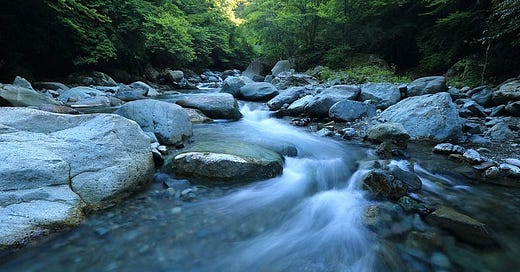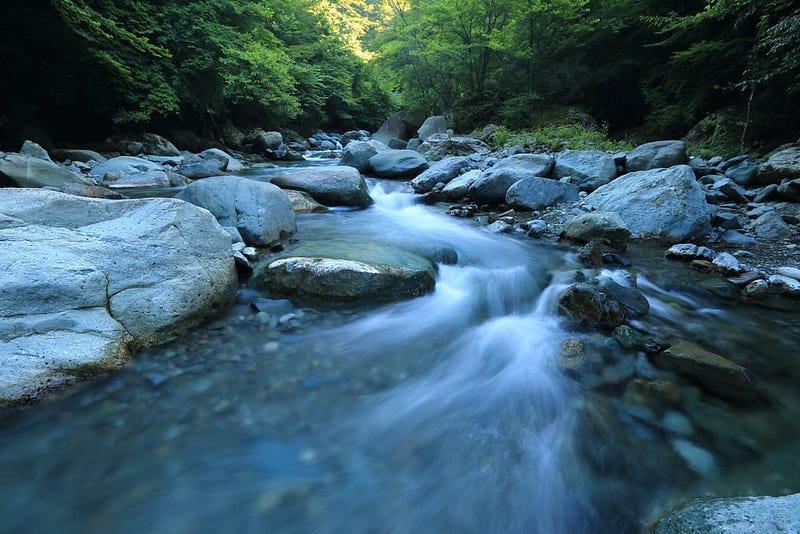Based On The Tao Te Ching’s Philosophy On Water: Lessons Learned On How To Change Your Life Outlook…
It’s commonplace to be overwhelmed with the pace at which life moves around us. While we go about our daily work & living our life, it can…
It’s commonplace to be overwhelmed with the pace at which life moves around us. While we go about our daily work & living our life, it can all be overwhelming at times & we might find ourselves lost in the midst of all the change around us.
We might fight and question and find a lack of fulfilment and lack of purpose and meaning while living out our lives from one day to the next.
As I’ve recounted in an old post of mine, about the “Four Pillars Of Meaning”, a lack of meaning and purpose in our life, can lead to a feeling of angst and unfulfillment & further prevent us from leading a life best aligned to our passions, our goals, and best suited to our desires, feelings and a purpose that resounds with us.
It’s essential reflect & re-asses our goals and the way we live life so that we can be more in tune with the natural harmony of the flow of the universe.
This existential feeling, which can occur at certain instances, is something that many people around the world grapple with, and was the same feeling that Raymond Tang felt at a certain point in his life.
“You may know this feeling: you wake up to multiple unread notifications on your mobile phone. Your calendar is already packed with meetings, sometimes double- or triple-booked. You feel engaged, you feel busy. In fact, you feel productive. But at the end of it all, something still feels missing. You try to figure out what it is. But before you do, the next day starts all over again. That was how I felt two years ago. I felt stressed; I felt anxious. I felt a bit trapped. The world around me was moving very quickly. And I didn’t know what to do. I started wondering to myself: How do I keep up with all this? How do we find fulfillment in a world that’s literally changing as fast as we can think, or maybe even faster?” he says
He began reading self help books to look for answers as to why he was feeling this way, but as he puts it, he felt more “stressed” and “anxious”, reading them, and as he recounts it, it was like “feeding my mind with junk food, and I was becoming mentally obese.”
He then stumbled upon the ‘Tao Te Ching’, which is an ancient Chinese philosophy book dated back to more than 2,600 years ago. And it was, as he says, “by far the thinnest and the smallest book on the bookshelf. It only had 81 pages. And each page had a short poem.”
The poem Tang stumbled upon was about living life like ‘water’, which read:
“The supreme goodness is like water.
It benefits all things without contention.
In dwelling, it stays grounded.
In being, it flows to depths.
In expression, it is honest.
In confrontation, it stays gentle.
In governance, it does not control.
In action, it aligns to timing.
It is content with its nature and therefore cannot be faulted.”
It was after reading this short poem, that Tang felt a sense of comfort and peace. It reflected on living life just like the flow of water. He divided the lessons he learnt into three parts.
Humility
Like it says in the poem, water benefits ‘all things without contention’ and in ‘dwelling it stays grounded’, this reflects on humility and living life as humble as possible, remembering our roots, staying truthful, humble and honest, and trying to do things that benefit the collective more than looking at personal benefit.
“The first lesson is about humility. If we think about water flowing in a river, it is always staying low. It helps all the plants grow and keeps all the animals alive. It doesn’t actually draw any attention to itself, nor does it need any reward or recognition. It is humble. But without water’s humble contribution, life as we know it may not exist. Water’s humility taught me a few important things. It taught me that instead of acting like I know what I’m doing or I have all the answers, it’s perfectly OK to say, “I don’t know. I want to learn more, and I need your help.”
It also taught me that, instead of promoting my glory and success, it is so much more satisfying to promote the success and glory of others. It taught me that, instead of doing things where I can get ahead, it so much more fulfilling and meaningful to help other people overcome their challenges so they can succeed. With a humble mindset, I was able to form a lot richer connections with the people around me. I became genuinely interested in the stories and experiences that make them unique and magical. Life became a lot more fun, because every day I’d discover new quirks, new ideas and new solutions to problems I didn’t know before, all thanks to the ideas and help from others.
All streams eventually flow to the ocean because it is lower than them. Humility gives water its power. But I think it gives us the capacity to remain grounded, to be present, to learn from and be transformed by the stories of the people around us,” he says
Harmony
The second lesson the poem suggests, was about living in ‘harmony’. This reflects on how we can be more attuned to the natural flow of the universe by being more in sync to the flow of life.
Instead of fighting and opposing the natural flow of things, it’s better to sit back and relax and let things unfold as they do. Instead of trying to forcibly change and interfere and force our will on life, it’s better to do our work and duty and ‘let go’ and trust the natural order and flow of life.
He reflects on changing our outlook, to achieving more ‘harmony’ instead of achieving more ‘success’.
He says:
The second lesson I learned is about harmony. If we think about water flowing towards a rock, it will just flow around it. It doesn’t get upset, it doesn’t get angry, it doesn’t get agitated. In fact, it doesn’t feel much at all. When faced with an obstacle, somehow water finds a solution, without force, without conflict. When I was thinking through this, I began to understand why I was feeling stressed out in the first place. Instead of working in harmony with my environment, I was working against it. I was forcing things to change because I was consumed by the need to succeed or to prove myself. In the end, nothing did. And I got more frustrated. By simply shifting my focus from trying to achieve more success to trying to achieve more harmony, I was immediately able to feel calm and focused again.
I started asking questions like: Will this action bring me greater harmony and bring more harmony to my environment? Does this align with my nature? I became more comfortable simply being who I am, rather than who I’m supposed to be or expected to be. Work actually became easier, because I stopped focusing on things that I cannot control and only on the things that I can. I stopped fighting with myself, and I learned to work with my environment to solve its problems.
Nature does not hurry. Yet, everything is accomplished. That’s Tao Te Ching’s way of describing the power of harmony. Just as water is able to find a solution without force or conflict, I believe we can find a greater sense of fulfillment in our endeavors by shifting focus from achieving more success to achieving more harmony.
Openness
The third lesson was about openness i.e. being open to change.
Water changes according to its present circumstance and its present situation. Just as water takes the form of whichever medium it’s present in, like a cup, a vase, or a glass, or changing from liquid to solid or gas, when it’s too hot or cold, we too must be open to change and open to learn and reinvent ourselves as life changes around us.
By being open to change and readjusting ourselves and our lives to the constant change around us, we can live in more peace, contentment and fulfilment.
By adapting and changing according to our constantly changing environment, and being open to change instead of resisting it & forcing our will on it, we can grow and live much more in tune with the rapidly moving pace of the world around us.
In his TED Talk, Raymond Tang outlines the lessons he learnt from the Tao Te Ching’s Philosophy On Water, which is a nice, humble and gentle reminder to adapt, live and grow according to the natural flow of life.





